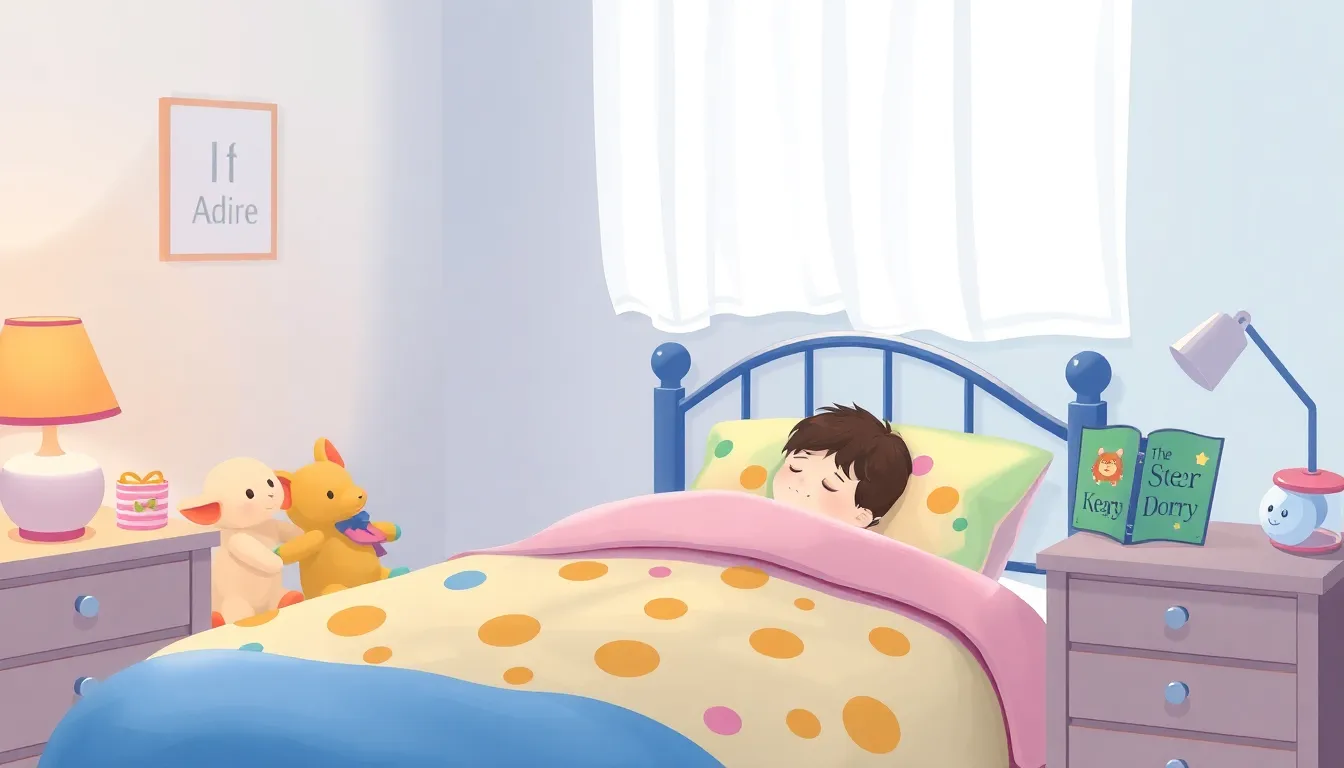When it comes to toddler bedtime, parents often find themselves in a nightly wrestling match. Should they tuck their little ones in at 7 PM or let them party until the sun comes up? The struggle is real, and it’s not just about getting enough sleep for those tiny humans. It’s about preserving sanity for the adults too!
Finding the perfect bedtime isn’t just a guessing game; it’s a science. A well-timed snooze can mean the difference between a cheerful morning and a toddler tornado. Understanding the ideal bedtime for toddlers can help parents avoid the dreaded “I’m not tired!” battle. So, let’s dive into the world of toddler sleep schedules and discover what time really is the right time for those little bundles of energy to hit the hay.
Table of Contents
ToggleUnderstanding Toddler Sleep Needs
Understanding toddler sleep needs plays a vital role in establishing an effective bedtime routine. Sleep significantly impacts a child’s overall growth, emotional regulation, and cognitive development.
Why Sleep Is Important for Toddlers
Sleep promotes essential brain development in toddlers. Studies show that adequate sleep enhances memory consolidation and learning abilities. Quality rest also supports emotional stability, reducing irritability and tantrums. When toddlers sleep well, their immune systems function better, leading to fewer illnesses. Furthermore, sleep helps maintain energy levels, allowing toddlers to engage in active play during the day.
Recommended Sleep Duration for Toddlers
Experts recommend toddlers aged 1 to 2 years receive 11 to 14 hours of sleep daily. Children aged 3 to 5 should aim for 10 to 13 hours. Splitting this duration into overnight sleep and naps is beneficial. For instance, a toddler may sleep for 10 to 12 hours at night and take one to two hours of napping during the day. Monitoring sleep duration helps parents ensure that their toddlers are well-rested and more receptive to daily activities.
Factors Influencing Bedtime

Several factors determine the appropriate bedtime for toddlers. Understanding these influences helps establish a consistent routine.
Age of the Toddler
Age plays a crucial role in determining when toddlers should sleep. Younger toddlers, specifically aged 1 to 2 years, require 11 to 14 hours of sleep daily. This need generally decreases as they approach 3 to 5 years, where they should aim for 10 to 13 hours. Parents must consider these age-specific requirements to set a suitable bedtime, ensuring toddlers are appropriately rested for daily activities.
Daily Activities and Routines
Daily activities significantly impact a toddler’s bedtime. Higher activity levels during the day can lead to increased fatigue, prompting quicker sleep onset. Consistent routines establish predictability, signaling to toddlers that it’s time for sleep. Integrating calm pre-bedtime activities, such as reading or quiet play, enhances relaxation, promoting a smoother transition to sleep.
Individual Sleep Patterns
Individual sleep patterns also dictate bedtime flexibility. Some toddlers naturally doze off earlier or later than others, depending on their unique rhythms. Parents should observe signs of sleepiness, including rubbing eyes or becoming less active. Tailoring bedtime to align with these patterns ensures toddlers receive necessary rest while respecting their natural inclinations.
Establishing a Healthy Bedtime Routine
Creating a solid bedtime routine significantly improves a toddler’s sleep quality and overall well-being. Parents can implement specific strategies to establish a conducive sleep environment.
Creating a Relaxing Environment
A calming atmosphere promotes relaxation. Dim the lights to signal winding down before sleep. Soft music or white noise can mask disruptive sounds and help toddlers drift off. Keeping the room at a comfortable temperature also enhances sleep quality. Toys and distractions should be removed from the sleep area. An organized space fosters tranquility, ensuring toddlers feel secure as they prepare for bed.
Consistency Is Key
Consistency reinforces healthy sleep habits. Setting a specific bedtime helps toddlers develop a natural sleep rhythm. Parents should strive to follow the routine daily, even on weekends. This predictability helps toddlers know when to expect sleep, reducing resistance. Bedtime routines that include calming activities, like reading or gentle conversations, further signal that it’s time to sleep. Recognizing individual sleep needs enables parents to adjust the routine as their child grows.
Signs That It’s Time for Bed
Recognizing when a toddler is ready for bed involves observing specific signs. These indicators can help parents determine the optimal bedtime for their children.
Behavioral Indicators
Frequent whining or crankiness often signals fatigue. Increased irritability may indicate a child is overstimulated. Lack of focus while playing or wandering aimlessly around the house suggests tiredness. They may also become less engaged in activities they usually enjoy. More pronounced meltdowns can occur as bedtimes approach, highlighting a child’s need for sleep. Observing these behaviors consistently enables parents to implement timely bedtimes.
Physical Cues
Rubbing their eyes can be a clear sign of sleepiness. Yawning is another common indicator that bedtime is nearing. Slouching or losing balance while standing shows fatigue. Children may also exhibit droopy eyelids, which indicates a need for rest. Moving slowly or finding a comfortable spot to sit can signal that they are ready to sleep. Recognizing these physical signs helps ensure toddlers receive adequate rest for optimal development.
Establishing a consistent bedtime for toddlers is essential for their overall health and development. By paying attention to individual sleep needs and recognizing signs of fatigue, parents can create an effective bedtime routine that promotes restful sleep. A well-structured environment and calming pre-bedtime activities can significantly enhance sleep quality.
Maintaining this routine daily helps reinforce healthy sleep habits and supports emotional and cognitive growth. Ultimately, finding the right balance between bedtime and daily activities not only benefits toddlers but also provides parents with much-needed peace of mind. Prioritizing sleep ensures that little ones are well-rested and ready to embrace each day with energy and enthusiasm.



